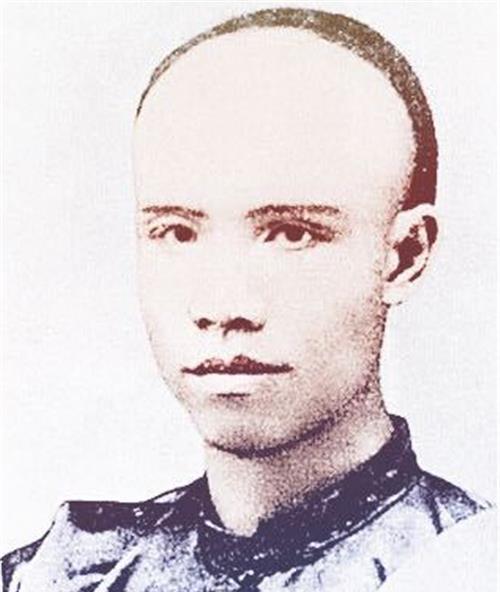"I smile at the sky with a horizontal knife, and go to keep the liver and gallbladder for two Kunlun", these two poems have always been used as the best poems for generous death, but many people have heard of this sentence, but few people know the origin of this sentence, it is one of the six gentlemen of Wu Shu, Tan Sitong, wrote in prison.

The Six Gentlemen of Wushu were composed of six people, including Tan Sitong, Kang Guangren, Lin Xu, Yang Shenxiu, Yang Rui, and Liu Guang, and since Kang Youwei fled quickly after the failure of the reform and failed to inform his younger brother Kang Guangren, Cixi asked him to send Kang Guangren to Caishikou as a brother instead of a brother.
Tan Sitong is a family of official eunuchs, his father Tan Jixun served as the governor of Hubei, from childhood can be said to be a golden cloth, jade food, at the age of 10, Tan Sitong worshiped Liuyang Ouyang Zhonghu as a teacher, under his influence, he liked the knowledge of the world and was very disgusted with the traditional Eight Strands of Literature.
In 1884 (the tenth year of Guangxu), Tan Sitong felt that the pressure at home was too great, so he ran away from home, befriended famous scholars everywhere, and in the process of traveling around, he met the famous scholar Liu Renxi, under his guidance Tan Sitong studied the materialistic spirit of Wang Fu, and at the same time he studied Western books on science and politics.
When the Qing government signed the "Treaty of Maguan", all the major heroes were heartbroken and full of sorrow, and in 1895 (the twenty-first year of Guangxu), Kang Youwei united more than 1,000 people to petition the Qing government to change the law, and the ideas led by Kang Youwei were exactly what Tan Sitong wanted to pursue.
In 1896, Tan Sitong entered Beijing, befriended Liang Qichao, Kang Youwei and others, and assisted Liang Qichao to vigorously publicize the theory of reforming the law, under the strong recommendation of Kang Youwei, the Guangxu Emperor finally advocated the change of law, Tan Sitong, as the main backbone of the restoration school, was also reused by the Guangxu Emperor.
The Guangxu Emperor also summoned Tan Sitong many times and said to him: Ru and others who want to change can play at will, and I will obey. That is, I have made a mistake, ru and so on rebuke me in person, and I will change it quickly. Tan Sitong was very touched by the Guangxu Emperor's determination to change the law, but Cixi had already conspired.
In 1898, Cixi put the Guangxu Emperor under house arrest, extinguished the New Deal in one fell swoop, and arrested the Restoration faction, Kang Youwei heard about this incident, and immediately informed Tan Sitong to flee with him, but Tan Sitong refused to leave, and launched various activities to plan to rescue the Guangxu Emperor, but he had more than enough and insufficient strength, and in just three days, Tan Sitong was arrested at the Liuyang Guild hall.
The six gentlemen of Wushu were also arrested by Cixi one after another, and in prison, Tan Sitong wrote "Inscription Wall in Prison", which refers to Tan Sitong's stay and Kang Youwei's escape, which are equally great, as vast as Kunlun, and in 1898, Tan Sitong and the other five were pressed to the Caishikou execution ground outside Xuanwu Gate.
Before the execution, Tan Sitong's wife came to deliver the severed head meal, and she asked Tan Sitong what to do in the future if she had not yet given birth to a child for him! Under the feudal ideology, filial piety is greater than three queens, and after losing her husband, women can only pin their spirits on their children.
Tan Sitong did not have children because of his busy career, but Tan Sitong was not the kind of person who was influenced by feudal ideas, and his answer to his wife was: If the child is born in such a society that cannot even see the future, it is better not to be born.
Tan Sitong's words, combined with the background of the Qing Dynasty at that time and his ideas for restoration, are also natural, but this sentence has also affected many young men and women in modern times, who also do not want to have children for various reasons.